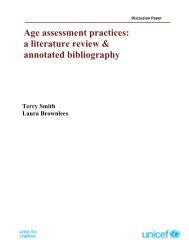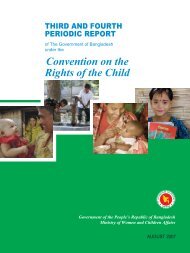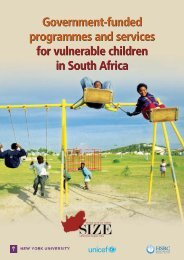EFA Goal 1: Early childhood care and education; Asia ... - Unicef
EFA Goal 1: Early childhood care and education; Asia ... - Unicef
EFA Goal 1: Early childhood care and education; Asia ... - Unicef
You also want an ePaper? Increase the reach of your titles
YUMPU automatically turns print PDFs into web optimized ePapers that Google loves.
Figure 13 indicates that the number of pupils per teacher increased in a few countries between<br />
2000 <strong>and</strong> 2009. Recent discussions in the <strong>Asia</strong>-Pacific region appeal for investments in teacher<br />
training <strong>and</strong> to rethink activities <strong>and</strong> programme content to address quality issues more creatively,<br />
especially since meeting Western st<strong>and</strong>ards for class size can be particularly daunting (Bennett,<br />
2004). For example, using empathy <strong>and</strong> social-emotional skills, culturally relevant group games<br />
<strong>and</strong> activities or rotational leadership processes can help children in family-based <strong>and</strong> structured<br />
ECCE settings work collaboratively on group activities. These experiences can be targeted towards<br />
developing skills for playing <strong>and</strong> working together, for ‘teaching’ gender equality in having both<br />
boys <strong>and</strong> girls lead <strong>and</strong> follow, <strong>and</strong> for the interpersonal, social <strong>and</strong> emotional development of<br />
children. This does not mean that a larger class size is better, but in a context in which there is lack<br />
of trained <strong>care</strong>givers, more creative strategizing may be necessary as an interim measure. Smaller<br />
child-<strong>care</strong>giver groupings are still important for stimulation, development <strong>and</strong> adequate protection<br />
for young children; but <strong>care</strong>ful analyses <strong>and</strong> sharing of experiences that are rooted in the cultural<br />
contexts need to be strengthened.<br />
Figure 13: Number of pupils per teacher in pre-primary <strong>education</strong>, 2000 <strong>and</strong> 2009<br />
Students per teacher<br />
50 2000<br />
Central <strong>Asia</strong><br />
East <strong>Asia</strong> <strong>and</strong> the Pacific<br />
South <strong>and</strong><br />
West <strong>Asia</strong><br />
2009<br />
40<br />
30<br />
20<br />
10<br />
Kyrgyzstan<br />
Mongolia<br />
Tajikistan<br />
Central <strong>Asia</strong><br />
Kazakhstan<br />
Uzbekistan<br />
Japan<br />
Cambodia<br />
China<br />
Malaysia<br />
Brunei Darussalam<br />
East <strong>Asia</strong> <strong>and</strong> the Pacific<br />
Lao PDR<br />
Myanmar<br />
Viet Nam<br />
Macao (China)<br />
Republic of Korea<br />
Nauru<br />
Cook Isl<strong>and</strong>s<br />
Hong Kong (China)<br />
Samoa<br />
Vanuatu<br />
Indonesia<br />
New Zeal<strong>and</strong><br />
Maldives<br />
World<br />
Note: Ranked by data for 2009.<br />
Source: EDN <strong>Goal</strong> 6, Statistical Annex, UIS, 2011.<br />
In addition to class size <strong>and</strong> teacher training, there are several other issues that need to be addressed<br />
regarding quality. Teaching in ECCE centres continues to be delivered in didactic <strong>and</strong> academic<br />
formats rather than as play-based activity that is exploratory <strong>and</strong> joyous; the cognitive benefits of<br />
delivering good-quality, play-based curriculum to children not only outweigh any potential costs<br />
but may even serve as investments in a more engaged workforce because it eases the full burden<br />
of child <strong>care</strong> on parents <strong>and</strong> <strong>care</strong>givers.<br />
Other noteworthy initiatives for improving quality through parenting <strong>and</strong> community-based<br />
initiatives include mother tongue-based multilingual ECCE programmes (Kazakhstan, Malaysia,<br />
Myanmar <strong>and</strong> Viet Nam); home-based programmes (Cambodia) <strong>and</strong> research on ‘brain-based’<br />
learning <strong>and</strong> Book Start (promoting reading by children <strong>and</strong> parents in Thail<strong>and</strong>). Examples of<br />
important centre-based initiatives include organizing ECCE programmes at non-formal <strong>education</strong><br />
centres (for children of young mothers attending literacy training), parent <strong>education</strong> programmes<br />
(Bangladesh <strong>and</strong> Philippines) included as part of a centre-based ECCE programme, <strong>and</strong> ECCE<br />
programmes attached to primary schools (Lao PDR).<br />
<strong>EFA</strong> <strong>Goal</strong> 1: <strong>Early</strong> Childhood Care <strong>and</strong> Education<br />
31

















